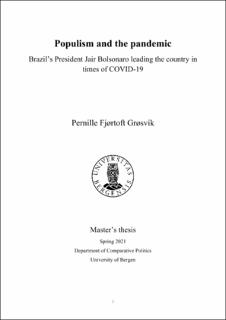| dc.description.abstract | While there are many studies on the buzz-word populism, there are far fewer studies on how populism effects crisis management. When the World Health Organization declared the COVID-19 disease a global pandemic on March 11th, no one knew that Latin America would be declared the epicentre of the pandemic by WHO on May 26th , and still be the epicentre over a year later. Although Brazil is a relatively advanced state compared to most of its Latin American neighbours, the first half of 2020 with the pandemic proved challenging for Brazil. Brazil performed worse than what could be expected in terms of deaths and infected, given its level of medical expertise.
Previous research defines populism in two main categories; one school of thought refed to as the ideational approach views populism as a thin ideology which gets adopted by a leader who already possesses a main ideology. Populism thus becomes a strategic approach, supplementing an addition underlying ideology. The second school of thought to understanding populism, is the Essex school which understands populism to be a discourse, where the pure people versus the corrupt elite are the core of what constitutes populism. I adopt the ideational approach in this study. Studying COVID-19 had me face challenges given its ongoing character, in addition to the nature of the pandemic this study is performed during. I could not travel to Brazil, nor conduct interviews. Given the limitations, the study analyses a large sample of qualitative data: 6325 Brazilian newspaper publications. After analysing and structuring the policy responses from Bolsonaro chronologically, I looked into what constituted Brazil’s populist President Jair Bolsonaro’s crisis management in his response to COVID-19 via McKee et al. (2020) four mechanisms of populism; (1) Blaming outsiders and victims, (2) Contempt for institutions, (3) Denialism and (4) Suspicion of elites.
Contrary to what was assumed, Brazil did experience large numbers of deaths and infected compared to neighbouring countries. My findings indicate that Bolsonaro’s crisis handling showed large signs of his populist approach, which in turn I found to be marked by blaming outsiders and victims, contempt for institutions, denialism, and suspicion of elites. A report for the Universidade de São Paulo concludes that Bolsonaro and his government actively worked for the virus to spread, wanting it to resume the normal economic activity the pandemic threatened, as soon as possible. | |
